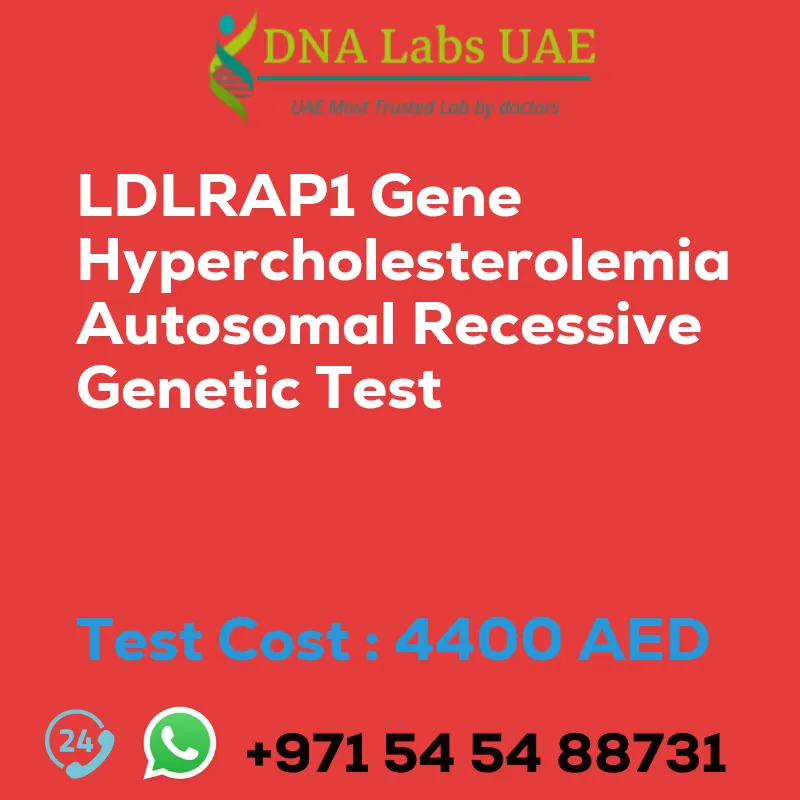LDLRAP1 Gene Hypercholesterolemia Autosomal Recessive Genetic Test
Test Name: LDLRAP1 Gene Hypercholesterolemia Autosomal Recessive Genetic Test
Components: Blood or Extracted DNA or One drop Blood on FTA Card
Price: 4400.0 AED
Report Delivery: 3 to 4 Weeks
Method: NGS Technology
Test Type: Metabolic Disorders
Doctor: General Physician
Test Department: Genetics
Pre Test Information: Clinical History of Patient who is going for LDLRAP1 Gene Hypercholesterolemia Autosomal Recessive NGS Genetic DNA Test. A Genetic Counselling session to draw a pedigree chart of family members affected with Hypercholesterolemia Autosomal Recessive.
Test Details
LDLRAP1 Gene Hypercholesterolemia is a genetic disorder characterized by high levels of cholesterol in the blood. It is caused by mutations in the LDLRAP1 gene, which is involved in the uptake and clearance of low-density lipoprotein (LDL) cholesterol from the bloodstream. This condition is inherited in an autosomal recessive manner, meaning that an affected individual must inherit two copies of the mutated gene, one from each parent, in order to develop the disorder. Individuals who inherit only one copy of the mutated gene are considered carriers and typically do not have symptoms of hypercholesterolemia.
NGS (Next-Generation Sequencing) Genetic Testing is a diagnostic method used to identify genetic mutations or variations in an individual’s DNA. It is a high-throughput sequencing technology that allows for the simultaneous analysis of multiple genes or the entire genome. In the context of LDLRAP1 Gene Hypercholesterolemia, NGS Genetic Testing can be used to identify mutations in the LDLRAP1 gene that may be responsible for the disorder.
NGS Genetic Testing involves obtaining a DNA sample from the individual, usually through a blood sample or a cheek swab. The DNA is then sequenced using NGS technology, and the resulting data is analyzed to identify any mutations or variations in the LDLRAP1 gene. The test results can help confirm a diagnosis of LDLRAP1 Gene Hypercholesterolemia and inform treatment and management decisions.
It is important to note that genetic testing for LDLRAP1 Gene Hypercholesterolemia is typically recommended for individuals with a family history of the disorder or those who have unexplained high cholesterol levels. Genetic counseling is also often recommended before and after genetic testing to provide individuals with information about the implications of the test results and to help them make informed decisions about their health.
| Test Name | LDLRAP1 Gene Hypercholesterolemia autosomal recessive Genetic Test |
|---|---|
| Components | |
| Price | 4400.0 AED |
| Sample Condition | Blood or Extracted DNA or One drop Blood on FTA Card |
| Report Delivery | 3 to 4 Weeks |
| Method | NGS Technology |
| Test type | Metabolic Disorders |
| Doctor | General Physician |
| Test Department: | Genetics |
| Pre Test Information | Clinical History of Patient who is going for LDLRAP1 Gene Hypercholesterolemia autosomal recessive NGS Genetic DNA Test A Genetic Counselling session to draw a pedigree chart of family members affected with Hypercholesterolemia autosomal recessive |
| Test Details | LDLRAP1 Gene Hypercholesterolemia is a genetic disorder characterized by high levels of cholesterol in the blood. It is caused by mutations in the LDLRAP1 gene, which is involved in the uptake and clearance of low-density lipoprotein (LDL) cholesterol from the bloodstream. This condition is inherited in an autosomal recessive manner, meaning that an affected individual must inherit two copies of the mutated gene, one from each parent, in order to develop the disorder. Individuals who inherit only one copy of the mutated gene are considered carriers and typically do not have symptoms of hypercholesterolemia. NGS (Next-Generation Sequencing) Genetic Testing is a diagnostic method used to identify genetic mutations or variations in an individual’s DNA. It is a high-throughput sequencing technology that allows for the simultaneous analysis of multiple genes or the entire genome. In the context of LDLRAP1 Gene Hypercholesterolemia, NGS Genetic Testing can be used to identify mutations in the LDLRAP1 gene that may be responsible for the disorder. NGS Genetic Testing involves obtaining a DNA sample from the individual, usually through a blood sample or a cheek swab. The DNA is then sequenced using NGS technology, and the resulting data is analyzed to identify any mutations or variations in the LDLRAP1 gene. The test results can help confirm a diagnosis of LDLRAP1 Gene Hypercholesterolemia and inform treatment and management decisions. It is important to note that genetic testing for LDLRAP1 Gene Hypercholesterolemia is typically recommended for individuals with a family history of the disorder or those who have unexplained high cholesterol levels. Genetic counseling is also often recommended before and after genetic testing to provide individuals with information about the implications of the test results and to help them make informed decisions about their health. |







